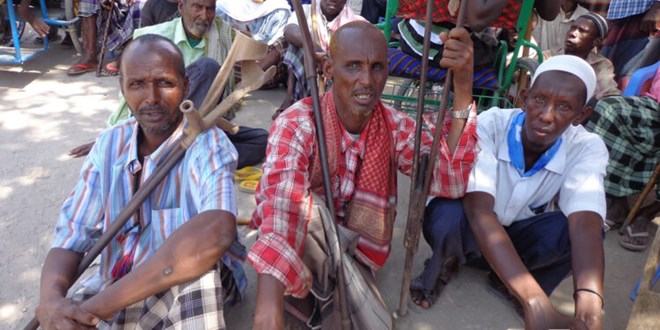
Wednesday November 15, 2023

Ten days after receiving $2,000 cash aid for shelter, Daud Ibrahim Abdi, a wheelchair user, had organised construction of a new house for his wife and five children enabling them to leave the IDP camp they were living in in Baidoa.
The family moved in to the house in Dugaan-dug area of Baidoa on 19 October, after seven years living in Al-Amin camp.
advertisements
Daud, whose legs are paralysed, is among 80 people living with disabilities who received $2,000 each to build their own homes from two international NGOs, ACTED and World Vision.Daud and three other IDPs pulled their money together and bought 40m2 land that they divided among them equally. He is very pleased to have a 10m2 piece of land to his name and a house with a toilet for his family.
“There is a big difference between now and when we lived in the camp. Now I’m someone with his own house, and I have got everything. Previously I was living in a camp with hundreds of people,” he said.
Daud’s family were displaced from Yeed area in Bakool region, where they owned a three-hectare farm, but drought and conflict forced them to abandon it.
He repairs watches and radios for a living, earning about $5-10 a day. The income is not enough to pay school fees for his children, which worries him.
“My main issue now is to see my children getting an education. But if I take them to school, I don’t have the money to pay their fees,” he said.
Another recipient of the shelter cash was Mohamed Nuur Adan, who has been living in IDP camps for a few years since migrating from Rooble-sheeg village, 40 kilometres from Baidoa.
Mohamed’s legs are both paralysed and he moves around using a hand-powered tricycle. He is happy to have got a 10m2 piece of land, especially at this time of heavy rainfall when IDP families in Baidoa are battling with flash floods demolishing their shacks.
He lives with his wife and nine children although despite getting his own land and house, he says life has not changed that much for them. The main challenge is that his family does not have a stable income to sustain them outside the camp.
He used to be a farmer but recurring drought in their village curtailed their farm productivity.
“We used to be farmers, the drought destroyed our farm and that’s why we left our areas. We decided to move to the city but we are still faced with hardship,” he explained.
He wakes up every morning and goes out to beg, returning home with about $3-4, which can only get them one meal.
“We don’t have a specific source of income. We beg for a living. My wife doesn’t work and my children are young. My family depends on me and I am disabled,” he said.
Some of the families receiving the shelter cash decided to pay off their debts instead of constructing a house.
Hassan Abdow Salad, a father of six, has not moved from his shelter in Al-Amin camp despite getting the aid money. He used $800 to pay off debts and much needed bought food and clothing for his children.
Hassan, who cannot walk, depends on his wife’s small income from cleaning jobs. He said the money has improved their lives and his family can now cook twice a day instead of the single meal they were getting.
“Before we got the help our situation was hard. Our children were in a very difficult situation because they didn’t get enough food. Now they get two meals a day,” he said.
Those who received money from this shelter fund for people living with disabilities have commended the project as timely due to the heavy rains battering Baidoa, even though not all of them prioritised using the cash for a new house.
World Vision did not wish to comment on the project when contacted by Radio Ergo’s local reporter.